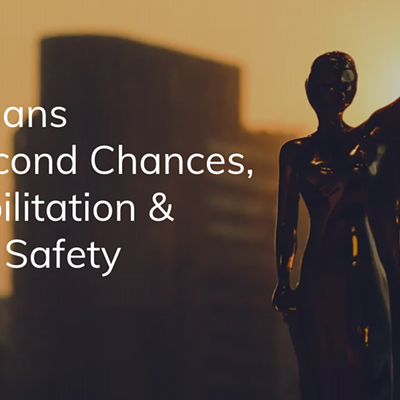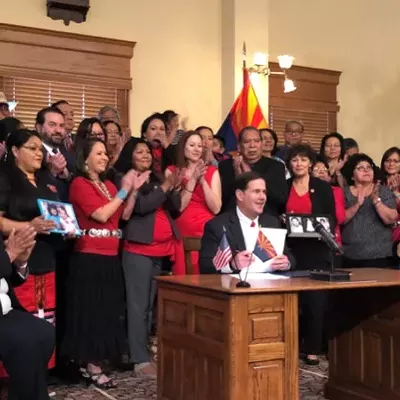Say you move into an apartment, and your teenager--to his delight--finds the last tenant's cable is still juiced up. Before you've even unpacked granny's china, the kid is already digging HBO for free.
The Catch? He just committed a Class 6 felony, punishable by a $150,000 fine and one year in jail.
If you find that absurd, you're not alone. This spring, such statutes drew together an unlikely, bipartisan knot of lawmakers intent upon restoring crime and punishment to a common-sense footing.
Although the cable felony remains intact (apparently due to industry lobbying), many similarly small-time crimes have been wrenched from felonies down to misdemeanors. The reclassifications range from the ownership of dangerous dogs and loan-sharking to "leaving a spouse in a destitute condition."
This new law also raises the monetary bar for turning misdemeanor thefts into felonies. For example, theft of property or services valued less than $1,000 is now a misdemeanor, and subsequent felony gradations have also been lowered.
Reversing a 20-year trend toward ever-tougher laws, the new statute has prosecutors squawking. But one of the measure's prime backers calls it a move towards legal sanity.
"Lawmakers don't really know what to do with crime," says Rep. Ted Downing, a Democrat from Tucson's District 28. "We can add more years (to an offense), and everybody thinks that reduces the crime. But if you do that, do you really decrease the incidence of a crime? That's a basic question that I've never seen anyone answer."
Downing hopes the law will ease prison overcrowding and reduce the number of lives ruined over piddling offenses. Typically, people facing felony charges are offered deals--maybe reduced fines, shortened jail time or even probation--in exchange for a guilty plea. But they often get more than they bargained for. "Once you have a felony conviction in our society," he says, "you're in deep, deep trouble."
That's because the punishment hardly ends when jail time or probation is complete. Instead, felons re-enter society bearing scarlet letters; getting good jobs, tapping into social services or even retaining child custody can all become dicey.
"The point is this: They (convicted felons) all come back out," Downing says. "We don't have lifetime imprisonment for most crimes." Facing Herculean hurdles, "many are likely to recommit."
Thinning the plethora of Arizona's felony laws will shrink the number of felons, he says, and make us all safer.
Not surprisingly, not everyone agrees. Among them is Kathleen Mayer, a deputy Pima County attorney who fought the felony reductions at the Legislature, crime by crime. "I'm just glad the list wasn't longer," she says.
For example, hiking the dollar threshold for felony theft "gives a signal to the community that crimes of this nature just don't seem that important," she says. "How many times do you get to burgle just under the $1,000 limit before (law enforcement) pays attention to you? It's a license to steal more from folks. I don't think victims of theft will feel very good about that."
Mayer also opposes the vicious dog reclassification, noting a number of bloody mauling incidents each year. "I think reducing that to a misdemeanor doesn't reflect the severity or the frequency of those kinds of situations," she says, "particularly in jurisdictions where you've got gang members using their dogs to attack other folks."
In the bigger picture, she says police departments won't enforce the former felonies as vigorously, "and it certainly may impact how we prioritize prosecutions."
But Downing doesn't buy it. Prosecutors simplify the world "into good people and bad people," he says. "They think if you're arrested on a felony, you've probably committed 10 other crimes you didn't get caught for."
Regardless of who's right, one thing is certain: Few politicians can resist any chance to appear tough on crime. And what better way to return to your district than with a hard-ass new law under your belt? Downing calls it "the politics of felony." The shortest route for getting attention in the Legislature "is by getting tough on crime. But then you have to find some (offense) to make a felony." The result, he says, is foolishness, such as the severe cable law.
Still, those laws sometimes offer a delicious peek behind the legislative curtain. In this case, he says, cable abuse was also slated for a lower classification--until powerful Cox Communications commenced a little arm-twisting. To Downing, it's shameless pandering to a business giant. "If we want to make a felony like that," he says, "then we should go after spitting on the sidewalk, and make that a felony as well."
Cox spokeswoman Andrea Katsenes didn't return a phone call seeking comment.
But lobbyists aren't the only worry for politicians pondering criminal-justice reform. Former Rep. Carole Hubbs, a moderate Sun City Republican, lost her District 4 seat after attempting similar changes during a 2003 legislative special session.
She proposed downgrading such crimes as hawking fake nursing diplomas or heisting native plants. Meager as they were, those proposals opened the door to Willie Horton-type attacks from her far-right Republican primary opponent. So nasty was this campaign blitz that Hubbs was reportedly pictured alongside notorious felons in a mass mailing.
It was a cautionary tale for all politicos.
Hubbs didn't return phone calls seeking comment. But Downing recalls the bloodbath. "She was attacked on that one issue, and not returned to the House," he says. "She was punished."
Nor did Gov. Janet Napolitano, a former state attorney general, help Hubbs' efforts by giving them a lukewarm reception during that long-ago special session, convened to address prison funding.
But Downing says Napolitano did sign the recent reforms into law--a signal that the politics of crime may be shifting. Another sign could be that Rep. Eddie Farnsworth, a conservative Gilbert Republican, was among the new law's chief sponsors.
Change, however, is measured by increment: Apparently, neither Napolitano's aides nor Farnsworth wanted to discuss the issue, despite attempts by the Tucson Weekly to obtain comment.
But what explains Farnsworth's transformation from hard-liner to reformer? One reason could be cost: The Arizona Department of Corrections is severely underfunded, and subsisting on costly staff overtime. Downing says he's constantly contacted by prison guards who report exhaustion and ebbing morale.
At the same time, getting tough on crime hasn't completely lost its caché. Attempts to turn illegal aliens into felons is a prime example--one that just may break the corrections bank, "There are an estimated 350,000 to 400,00 undocumented aliens in Arizona," Downing says. "And our current prison population is only at 33,000."
Just do the math. Oh, and pass the remote.










